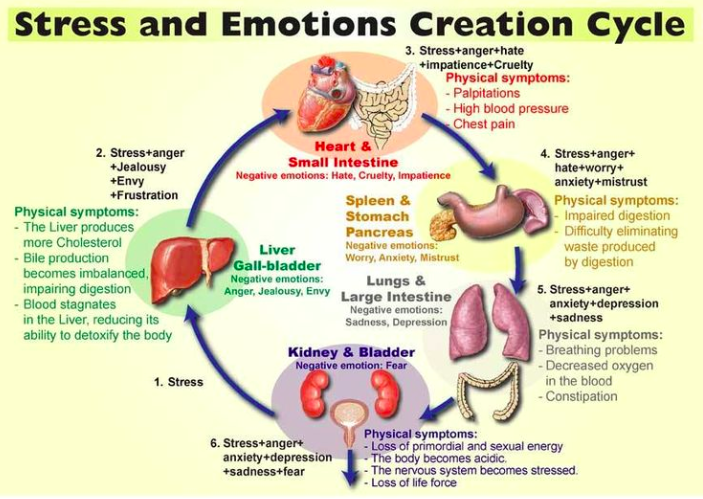Hormones and your Emotions: Which one is in Control?
Did you know that all ancient medicine, including Greek, Roman, Ayurvedic and Traditional Chinese knew that it is our emotions that impact the physical body and ultimately can control the outcome of our health?
Textbooks from the 1400’s all speak to a common thread, that emotions impact how our body is digesting and detoxing. If emotions are stuck, so is the body. However, as the world began to move in the direction of conventional medicine the body and mind were compartmentalized in a way that separated this very relationship until the mid 1900’s. Now there are numerous studies connecting how we feel, how we perceive the feeling, and what meaning we give that experience and the impact it has on our brain and hormones resulting in various changes in the body.
What are emotions?
I once read that they are the senses of the soul, and this rang so true for me and gave me an entirely different perspective in how I can learn from them. It is a way for our soul to communicate with us what needs to be healed. They are what give life colour and depth. Every experience we have has an emotion, or several emotions attached to it. When we hear a baby laugh, witness a friend get engaged, say your vows to the love of your life, to when you lose someone you love, to watching your kids go off to college, to experiencing adventures while travelling the world. Each experience is remembered through the lens of how you felt.
Stress and Emotions Creation Cycle
The challenge with emotions occurs when they feel like they are overwhelming your entire nervous system and you feel out of control. Like a woman in her luteal phase feeling irritable and higher levels of anxiety or a menopausal woman not knowing why she feels rage, or when we snap at our kids not knowing why we’re feeling so impatient. This is when the emotions are impacting not only our physiology and hormones, but our life.
When in an experience, the amygdala (emotional center in the brain), gathers information from the hippocampus (the memory center), informs the hypothalamus, which then signals the pituitary gland (master hormone coordinator in the brain) to release certain hormones, often signaling the release of stress hormones like cortisol and norepinephrine and epinephrine (aka adrenalin) to manage or deal with the experience. This is where we are stuck in a state of surviving and not thriving. Sometimes that is needed, if we are in true danger, however, most often we are stuck in traffic, having a challenge with our kids or partners, trying to make a deadline, or just simply moving through life surrounded by triggers that the brain has stored as dangerous.
The challenge with being stuck here is that it takes away from your sex hormones, like progesterone (as this hormone converts into cortisol), estrogen, DHEA, and testosterone, all hormones meant to keep us in a state of ease and thriving. This chronic state of stress then can result in various hormonal symptoms like irregular cycles, PMS, hot flashes, low libido, and even challenges with fertility.
This idea that emotions impact our health is the basis of most traditional and ancient medicine. In Chinese medicine there are specific emotions linked to specific organs in the body.
When these emotions are stored in the body, overtime that organ and the systems involved begin to show us symptoms so we can pay attention to what needs to change, specifically our reaction to the emotion. When we hold onto anger and resentment it diminishes the liver’s ability to detoxify, this in turn diminishes the body’s ability to remove excess estrogens causing symptoms like ovarian cysts, fibroids, breast tenderness, clots in the blood, all things associated with estrogen dominance. Studies have even shown anger to impact the immune system by raising interleukin 6, a cytokine that is high when there is inflammation in the body.
So, you see, how we feel, how we respond to how we feel, will impact everything. If we can learn to respond in a way that will allow us to use the information the emotion is providing, we can gain freedom from the overwhelm and any negative impact they may have on our hormones:
Strategies to respond to emotions rather than react…
Daily breath/meditation practice to learn to pause when you notice an emotion. Try this meditation for a calm heart
Gratitude practice to remind you of what is working – say out loud or write down 3 things that you feel grateful for in your day
Nutrients like magnesium to support the nervous system and bring calm into the body
Movement! Move the emotion out of the body through movement you love with intention, so it doesn’t get stored in your body- Dance your heart out if you need to!
Ask the question- when an emotion arises ask it questions. Why are you here? What are you trying to tell me? Who does this reaction belong to?
Emotions are a gift from our soul, they make life exciting and without them we would live a life of numbness. We do have the capacity to use them to benefit of us instead of depleting us.
References:
https://www.sciencefriday.com/articles/the-biology-behind-our-emotions/#:~:text=When%20we%20laugh%20or%20cry,and%20its%20influence%20on%20cognition.



